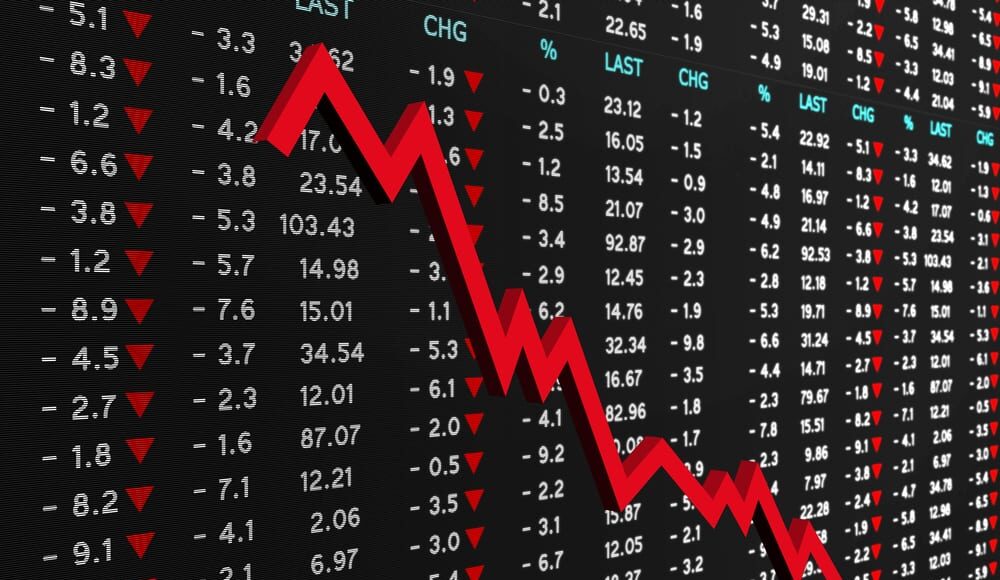Stock market crash: On Tuesday, January 21, the local share market suffered a severe setback. Everywhere, the selling was fierce.
The NSE’s NIFTY50 index closed at 23,024.65, down 320.10 points, or 1.37%, while the S&P BSE SENSEX was down 1,235.08 points, or 1.60%, at 75,838.36.
On the NIFTY50 index, nine equities closed the day in the green and 41 in the red.
Trent, NTPC, Adani Ports, ICICI Bank, and Adani Enterprises were the index’s top five losers.
Apollo Hospitals, Tata Consumer Products, BPCL, Shriram Finance, and JSW Steel were the top five gainers.
Out of the 4,088 equities that were traded on the BSE, 2,788 saw falls, 1,187 saw gains, and 113 stayed the same, indicating that the market breadth was in favor of declines.
As the m-cap of companies listed on the BSE fell from ₹431.59 lakh crore to ₹424.22 lakh crore, investor wealth fell by ₹7.36 lakh crore.
The BSE SmallCap index closed at 51,714.62, down 1,024.39 points, or 1.94%, while the BSE MidCap index ended at 43,167.39, down 882.10 points, or 2%, in the overall market.
All of the sectoral indices had significant declines at the end, with consumer durables and real estate suffering the most.
The volatility index, the India VIX, increased by over 4% to 17.06 levels.
These are some of the causes of Tuesday’s carnage on Dalal Street.
Investor trepidation as Trump assumes leadership: US President Donald Trump was criticized by investors worldwide when he announced shortly after taking office on Monday that his government was considering placing 25% tariffs on Canada and Mexico as early as February 1.
An analyst at Lemonn Markets Desk named Satish Chandra Aluri was quoted by Reuters as saying that market mood “remains fragile” in response to Trump’s policy statements.
Another market analyst stated that Trump’s tariff selections are still a wild card for Indian markets and that investors are being cautious due to the uncertainty surrounding his plans for tariffs on India.
Disappointing Q3 results: Investor sentiment was damaged by a number of businesses’ management comments, muted profits, and cautious outlook. For example, Zomato revealed a steep decline in its Q3 earnings and stated that the company’s margin expansion has slowed due to the heightened competition in rapid commerce. In response, the company’s and its competitor Swiggy’s stock fell more than 10%.
Additionally, optimism has been affected by the lackluster profits of major IT services companies, including TCS, Infosys, HCLTech, Wipro, LTIMindtree, and TechMahindra.
In addition, Dixon Technologies fell precipitously due to analyst concerns about valuation and the belief that its mobile business was at its zenith.
Versas investors keep selling: Due to the strength of the dollar, rising US bond yields, and anticipation of a disappointing results season, foreign investors have pulled out ₹50,912.60 crore from Indian equities this month.
The change in attitude coincides with both internal and international challenges.
“Foreign investors are pulling their money out of the Indian equity markets due to the ongoing depreciation of the Indian rupee,” stated Himanshu Srivastava, Associate Director-Manager Research at Morningstar Investment Advisers India.
According to Srivastava, investors are also becoming cautious due to the greater valuation of Indian stocks, even in light of recent losses, the prospect of a bad earnings season, and uncertainty regarding the rate of economic growth.
Market players were anxious before the Union Budget announcement, which was probably scheduled for February 1.
In order to ensure social security for all informal work, the analysts have demanded that the budget increase the minimum EPFO pension fivefold to ₹5,000 per month, increase the income tax exemption limit to ₹10 lakh annually, eliminate the new pension scheme and unified pension scheme, reinstate the old pension scheme, and impose an additional 2% tax on the super-rich.
Budget 2025 is not expected to have any major policy announcements. The budget is expected to highlight the government’s commitment to fiscal restraint in order to reach its fiscal deficit targets, given the current political stability. “We anticipate ongoing infrastructure investments,” stated Right Horizons PMS founder and fund manager Anil Rego.
The economy of India slows down: According to a recent piece in the New York Times, India’s efforts to become a sophisticated economy are being thwarted because industrial growth, the stock market, and the currency are all declining and most consumers make too little to keep them afloat.
“Political meddling, enormous red tape, and other well-known challenges continue to plague Indian companies. Although it has concentrated on expanding economic supply in recent years, the Modi government has attempted to lessen those constraints,” the piece continued.
Additionally, Moody’s projects that India’s GDP would expand by 6.6% in FY2025 (2025–2026). The first Advance Estimates from the National Statistics Office (NSO) predict that the Indian economy will expand by 6.4% during the current fiscal year, which ends in March 2025.











